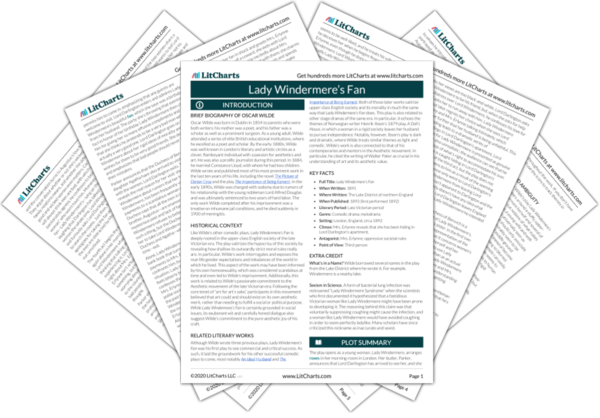Roses, which are typically associated with picturesque femininity, appear prominently at both the start and end of the play. At the beginning, Lady Windermere is arranging roses when Lord Darlington comes to visit her, which associates them with her simplistic views on morality and her dedication to performing the part of a perfect lady. From that point on, Lady Windermere’s understanding of the world and her role in it becomes increasingly complicated, with the play’s events showing her how things like morality are much more nuanced than she initially thought. However, the symbol of roses returns at the end of the play, with Lady Windermere looking forward to seeing the roses at the country house that she plans to visit with Lord Windermere. This symbolic return indicates that even with her newfound wisdom, Lady Windermere is still tempted to some extent by the comforting, simple version of perfection and femininity that she once believed in. Through her, the play seems to suggest people will always wish to play idealized roles and rely on straightforward ideas of good and evil, no matter how much evidence they have that the real world is more complicated.
Roses Quotes in Lady Windermere’s Fan
LORD WINDERMERE: (gravely) She is better than one thought her.
LADY WINDERMERE: She is better than I am.
LORD WINDERMERE: (smiling as he strokes her hair) Child, you and she belong to different worlds. Into your world evil has never entered.
LADY WINDERMERE: Don’t say that, Arthur. There is the same world for all of us, and good and evil, sin and innocence, go through it hand in hand. To shut one’s eyes to half of life that one may live securely is as though one blinded oneself that one might walk with more safety in a land of pit and precipice.

Unlock explanations and citation info for this and every other Lady Windermere’s Fan quote.
Plus so much more...
Get LitCharts A+









